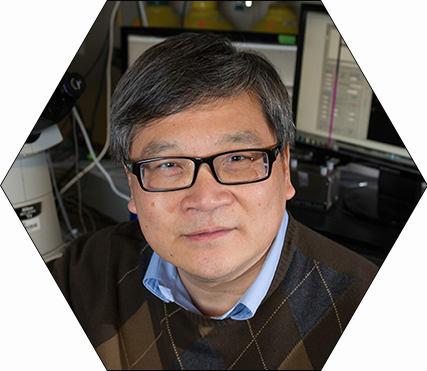Education
- Ph.D., Columbia University, 1988
- M.S., Columbia University, 1985
- B.S., Zhejiang University, China, 1982
Background
Dr. Zhu began his research career as a theoretician building mathematical models of cellular processes. After coming to Georgia Tech, Dr. Zhu established his laboratory and is currently conducting research in the full spectrum of integrated experimental, computational, and theoretical studies in bioengineering at the cellular and molecular levels. Dr. Zhu began at Tech in 1990 as an Assistant Professor. Prior, he was an Assistant Research Bioengineer at the University of California at San Diego.
 Research
Research
- Bioengineering; Biomechanics of single cells and single molecules, cell adhesion kinetics, and bio-MEMS
The goal of Dr. Zhu's research is to gain a fundamental understanding of important biological processes at the level of cells and molecules, and their relations to human health and diseases. Current research projects in the Zhu lab focus on the adhesion and signaling molecules in the immune system and the vascular system. The experiments utilize state-of-the-art technologies, including micropipette manipulation, atomic force microscopy, biomembrane force probe, and real-time laser scanning confocal microscopy. Genetic engineering approaches are used to alter the structures of biologically active molecules. The effects of such structural variation on the mechanical regulation of single pairs of molecular interactions are measured experimentally using ultrasensitive techniques at the pico Newton and nanometer levels and analyzed theoretically using nonequilibrium statistical physics models and molecular dynamics simulations. These projects are relevant to cardiovascular diseases, auto-immune and immunodifficient diseases, and cancer. Students who have a good background in physical sciences and engineering, a strong desire to discover the inner working of life at the cell and molecular levels, and a keen interest to work in a multidisciplinary field can find great opportunities in the Zhu lab. Dr. Zhu's research are primarily funded by the National Institutes of Health.
Links
News Release on "Catch Bonds"
News Release on Cell & Molecular Memory
News Release on Ph.D. Program with Chinese University
New release on "Kinetics of T cell receptors"
Study Maps Process Used by T Cells
- American Society of Mechanical Engineers
- Second Place in Bioengineering MS Student Paper Award (Advisor to Krishna Sarangapani), 2005
- First Place in Bioengineering MS Student Paper Award (Advisor to Jean Delobel), 1992
- Y. C. Fung Young Investigator Award (Bioengineering Division), 1991
- American Institute for Medical and Biological Engineering Fellow, 2006
- Biomedical Engineering Society
- Whitaker Graduate Student Paper Competition Winner
- Advisor to Wei Chen, 2007
- Advisor to Fang Zhang, 2004
- Advisor to Krishna Sarangapani, 2003
- Advisor to Scott Chesla, 1997
- Dr. Harold Lamport Award for a Young Investigator, 1991
- Whitaker Graduate Student Paper Competition Winner
- Sigma Xi (Georgia Tech Chapter)
- Faculty Best Paper Award, 2004
- Suddath Graduate Student Award (Advisor to Krishna Sarangapani), 2004
- Best Ph.D. Thesis Award (Advisor to Bryan T. Marshall), 2003
- Best M.S. Thesis Award (Advisor to Jean Delobel), 1993
- International Society for Clinical Hemorheology, Hemorheology and Microcirculation Award, 2005
- Science Applications International Corporation
- Best M.S. Thesis Award (Advisor to Adele H. Wright), 1998
- Southeast Biomedical Conference Best Student Paper Award (Advisor to Adele Wright), 1998
- Richard Skalak Bioengineering Colloquium at Columbia University, 2002
- Woodruff School Faculty Fellow, 1997-2002
- National Institutes of Health First Independent Research Support and Transition Award, 1995-2000
- National Science Foundation Presidential Faculty Fellow, 1993-1998
Representative Publications
- Huang et al. 2010. The Kinetics of Two-Dimensional TCR and pMHC Interactions Determine T-Cell Responsiveness. Nature 464, 932-936.
- V. I. Zarnitsyna et al. 2007. Memory in Receptor-Ligand Mediated Cell Adhesion. Proceedings of the National Academy of Science, U.S.A. 104, 18037-18042.
- Yago et al. 2008. Platelet Glycoprotein Ibalpha Forms Catch Bonds with Human WT vWF But Not with Type 2B von Willebrand Disease vWF. Journal of Clinical Investigation 118, 3195-3207.
- B. T. Marshall, et al. 2003. Direct Observation of Catch Bonds Involving Cell-Adhesion Molecules. Nature 423, 190-193.
- S. E. Chesla, P. Selvaraj, and C. Zhu. 1998. Measuring Two-Dimensional Receptor-Ligand Binding Kinetics by Micropipette. Biophysics Journal 75, 1553-1572.

